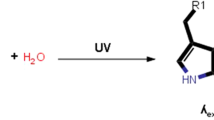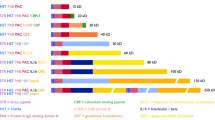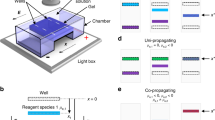Abstract
GEL electrophoresis allows the detection of radioactive compounds by contact with a photographic film. I have tried to separate radioactive ions by electrophoresis, using a thin layer of radiosensitive photographic gelatin as supporting medium. I hoped thus to locate smaller amounts of radioactive substances within a shorter time and, above all, to achieve higher efficiency in detection and location of tritium-labelled molecules through autoradiography. This communication gives a brief account of the first runs of autoradiographic electrophoresis in a thin layer of buffered photographic gelatine and affords a glimpse of the possibilities of this new type of supporting medium.
This is a preview of subscription content, access via your institution
Access options
Subscribe to this journal
Receive 51 print issues and online access
$199.00 per year
only $3.90 per issue
Buy this article
- Purchase on Springer Link
- Instant access to full article PDF
Prices may be subject to local taxes which are calculated during checkout
Similar content being viewed by others
Author information
Authors and Affiliations
Rights and permissions
About this article
Cite this article
LAMBIOTTE, M. Autoradiographic Electrophoresis of Tritium-labelled Compounds in a Thin Layer of Buffered Photographic Gelatine. Nature 207, 516–517 (1965). https://doi.org/10.1038/207516a0
Published:
Issue Date:
DOI: https://doi.org/10.1038/207516a0
Comments
By submitting a comment you agree to abide by our Terms and Community Guidelines. If you find something abusive or that does not comply with our terms or guidelines please flag it as inappropriate.



